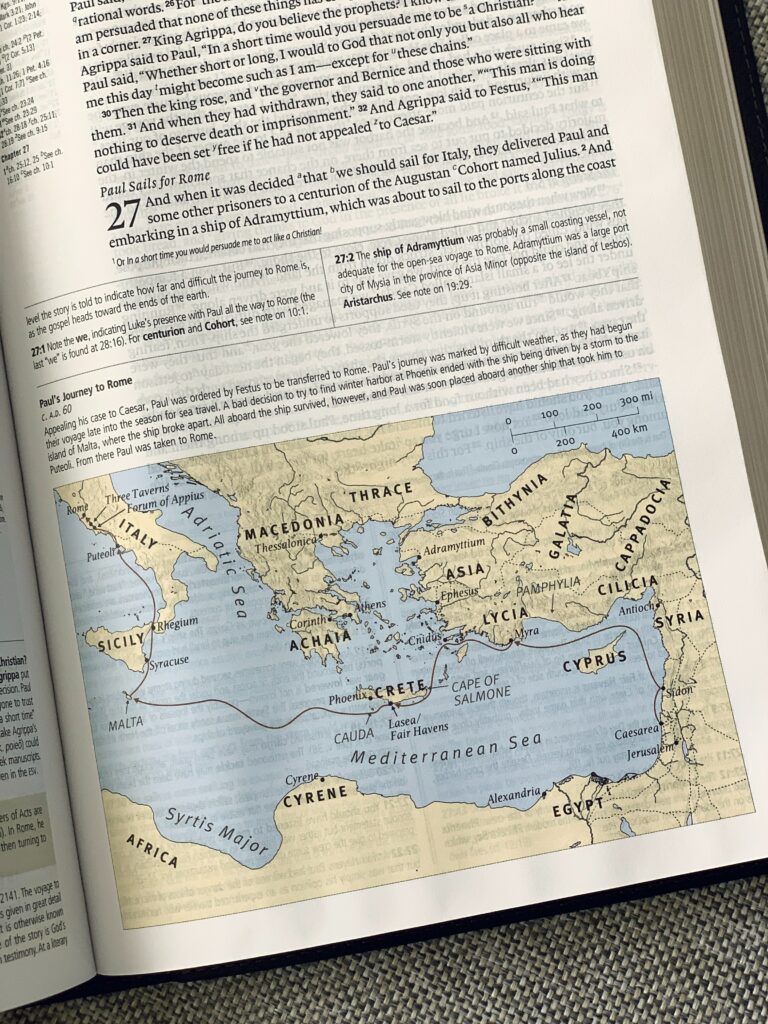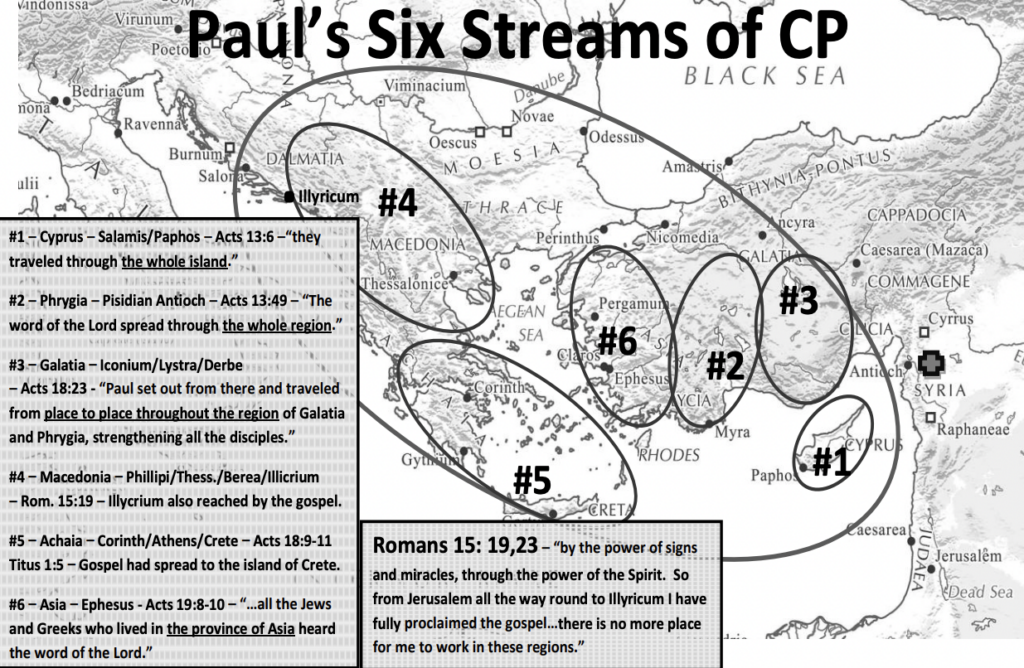What is No Place Left?

When the apostle Paul wrote the book of Romans and through inspiration from the Holy Spirit of God concluded that there is no more place for him to work in these regions (Romans 15:23), what did he mean exactly? What did Paul mean by his work and what gave him clues that it was in fact accomplished (Romans 15:18)?
Most scholars peg the writing of the book of Romans by Paul near the end of his third missionary journey as he was traveling back to Jerusalem from Ephesus and paused for three months in Greece (Acts 20:3). At this point in the Acts timeline, Paul’s journeys had taken him through much of the Roman Empire mainly Arabia, Syria, Cilicia, Cyprus, Galatia, Pamphylia, Macedonia, Achaia, and Asia over a 12-15 year time span and an estimated Roman empire population of 50 to 80 million people. Eckhard Schnabel suggests that if Paul did in fact make a trip to the island of Crete (Titus 1:5) and made it to Spain (Romans 15:24) that his travels totaled around 15,000 miles with 8,700 miles of that by land. With such a large task before him let’s look at Romans 15:17-24 to determine what Paul meant by No Place Left and what exactly convinced him that his job was completed.
Therefore I glory in Christ Jesus in my service to God. I will not venture to speak of anything except what Christ has accomplished through me in leading the Gentiles to obey God by what I have said and done— by the power of signs and wonders, through the power of the Spirit of God. So from Jerusalem all the way around to Illyricum, I have fully proclaimed the gospel of Christ. It has always been my ambition to preach the gospel where Christ was not known, so that I would not be building on someone else’s foundation. Rather, as it is written: “Those who were not told about him will see, and those who have not heard will understand.” This is why I have often been hindered from coming to you. But now that there is no more place for me to work in these regions, and since I have been longing for many years to visit you, I plan to do so when I go to Spain.
Romans 15:17-24
The Unknown Doer
First and foremost, Paul rightly acknowledges the work of God and what God alone had done and had accomplished (Romans 15:18) through his ministry over the past 12 to 15 years of his life. The finding and winning of people of peace, the acceptance of the gospel, the multiplication of disciples, and the planting of churches across the Roman Empire is all credited to the Lord and rightly so. Jesus explained in the parable of the growing seed that the farmer casts his seed on the ground, goes to bed, and wakes up to a crop though he doesn’t know how it happened (Mark 4:27). Paul understood who the unknown doer was and even explained to the Corinthians that it is God who makes the seed grow (1 Corinthians 3:6).
Entry
Secondly, Paul had entered the empty fields that the Lord had set before him. He said that from, “Jerusalem all around to Illyricum..” (Romans 15:19), this means that entering empty fields mattered to him. Paul had targets. The empty fields the Lord directed him to were ready for broad seed sowing. From the Holy Spirit sending them from Antioch (Acts 13:4) to the vision to go to Macedonia (Acts 16:10) to the wide door of effective service in Ephesus (1 Corinthians 16:9), the Lord had directed Paul to the locations he ministered in throughout his journeys. Paul’s targets and locations that he both entered and was forbidden to enter (Acts 16:6-7) were directed by the Holy Spirit. Did he personally cover every square mile from Jerusalem to Illyricum? Probably not, but the areas he entered and the peoples who believed owned the responsibility of gospeling, discipling, and forging through to new areas of entry until there was no place left.
Gospel
Thirdly, Paul says that he has “fully proclaimed the gospel of Christ” (Romans 15:19). As the Holy Spirit guided Paul to the various locations and peoples, he was convinced that he had presented the gospel in its fullness. To the church in Corinth he told them he ”resolved to know nothing while I was with you except Jesus Christ and him crucified” (1 Corinthians 2:2). Ultimately Paul knew the power of God is what brings salvation (Romans 1:16) and he himself experienced that power on the Damascus road. Did Paul have a mouth to ear conversation with every person from Jerusalem to Illyricum? Not likely, but a process had been put into motion where the gospel had been ringing out in places like Pisidian Antioch (Acts 13:49), Thessalonica (1 Thessalonians 1:7-8), and Ephesus (Acts 19:10). Paul was faithful to proclaim the gospel and he expected those who believed would turn around and share with their networks (oikos). They did and the gospel multiplied until there was no place left.
Disciple Making
Fourth, Paul said to the Romans that the Gentiles demonstrated obedience by word and deed (Romans 15:18 NASB). So not only has the gospel rang out in these areas but the Gentiles are becoming obedient to the commands of Jesus by their words and their actions. They were in fact doers of the Word, not hearers only (James 1:22). Jesus told the apostles to make disciples and teach them to obey my commands (Matthew 28:20). Paul, Barnabas, Silas, Timothy and others went about proclaiming the gospel, making disciples by teaching them how to obey Jesus, and expecting them to pass it on to others. What a joy it must have been for Paul to see his disciples making disciples who make more disciples (2 Timothy 2:2). Paul could say there is no place left because the disciples he left behind knew how to enter new areas, proclaim the gospel and make disciples.
Forming Churches
Fifth, Paul says “it was always his ambition to preach the gospel where Christ was not known so he wouldn’t be building on someone else’s foundation” (Romans 15:20). As Paul discipled those who believed he gathered them around their community and they learned to obey Jesus together and advance the gospel in their own locale. Paul planted churches and expected them to make disciples and gather them into new churches. Paul could say that there was no place left for him to work because the churches he left behind knew how to make disciples and gather them into churches and the process would continue.
Multiplying Leaders
Lastly, Paul discipled and developed leaders who knew how to do all of these aspects. Paul equipped and mobilized as many as he could who knew how to enter new areas, share the gospel, make disciples, form them into community (church). As those churches were planted the Holy Spirit began to call out other sent ones who would go to the next area, the next community, the next village, and connect, share, and gather them into church. Going back to Acts 20:4, Paul traveled back to Jerusalem at the end of his journeys and was surrounded by leaders he’d been working with from every locale he ministered in. Paul had developed multiple leaders in Asia, Thessalonica, Berea, and Derbe who would carry on the missionary task of Kingdom expansion throughout the Roman Empire and to the ends of the earth (Acts 1:8). Now Paul’s next empty field was Spain (Romans 15:24). This is what Paul meant by No Place Left.

May the Lord continue to raise up workers to work the harvest (Luke 10:2) who know how to enter new areas, share the gospel, make disciples, plant churches, and multiply leaders until there is no place left where the name of Jesus hasn’t been heard. Amen.
